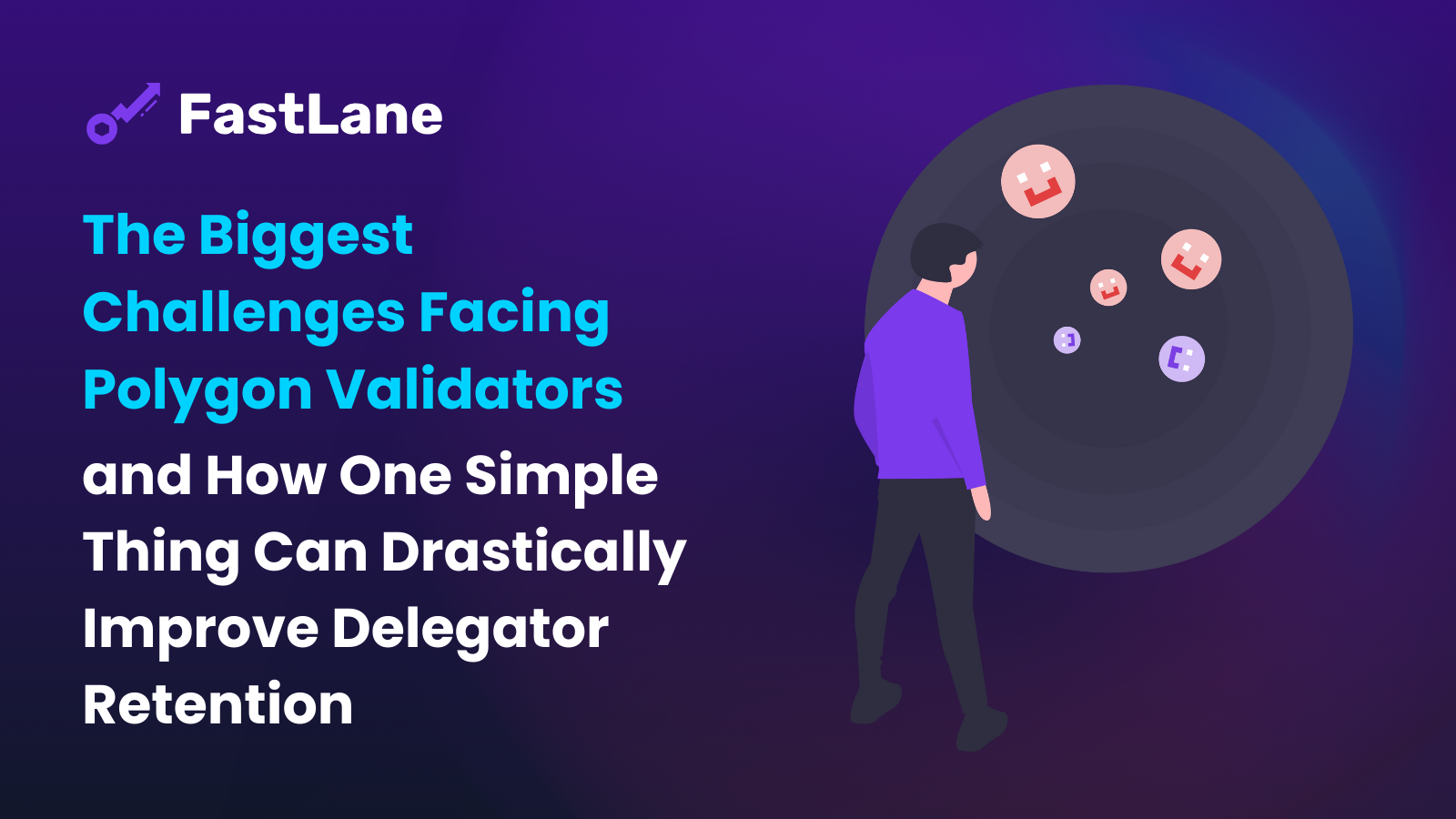The Biggest Challenges Facing Polygon Validators and How One Simple Thing Can Drastically Improve Delegator Retention
2023-09-28

VALIDATORS
The Polygon network is becoming a big player in DeFi, offering scalability and low transaction costs.
However, as the network grows, so do the challenges for validators.
This article aims to shed light on the most pressing issues facing Polygon validators and how a simple solution can significantly improve delegator retention.
The Validator's Dilemma
Validators are the backbone of the Polygon network, responsible for validating transactions and creating new blocks.
However, the role comes with its set of challenges:
1. Infrastructure Costs
Running a validator node isn't cheap. From server costs to security measures, the financial burden can be significant. This is especially true for smaller validators who don't have the backing of institutional investment funds.
2. Network Security
Validators are constant targets for adversarial attacks. Whether it's DDoS attacks or attempts to exploit vulnerabilities, maintaining a secure environment is a full-time job.
3. Governance Participation
Being a validator isn't just about transaction validation; it's about active participation in network governance. Validators are expected to vote on protocol upgrades, which requires a deep understanding of the ecosystem.
4. MEV Challenges
Maximal Extractable Value (MEV) is a complex task that requires a deep understanding of the network and smart contract interactions.
Failing to optimize for MEV can result in significant financial losses.
5. Transaction Spam
In February of 2022 a serious threat to the Polygon blockchain arose.
The network’s stability was in jeopardy due to nodes being flooded with spam transactions sent by arbitrageurs, liquidators, and gamers looking for Maximal Extractable Value.
These actors, known collectively as ‘searchers,’ look to profit from inefficiencies in the ordering of transactions.
The ultimate goal of the searchers is to extract profit by using bots to ‘search’ for opportunity-creating transactions which can be exploited by quickly placing their own transactions directly after–and sometimes before–said transaction.
In the process of competing over opportunities, searchers can create spam transactions which lead to suboptimal user experiences such as delayed execution, slippage, and network congestion.
These spam transactions can cause instability in validator nodes, as observed during the outages in Q1 of 2022.
The Delegator's Perspective
From the delegator's point of view, especially institutional ones, the focus is on long-term growth and stability.
They are not interested in validators who offer high returns but can't guarantee security or have a history of poor governance participation.
If a validator isn’t careful to foolproof their node from threats such as arbitrageur spam, this can lead to node instability and potential downtime.
From a delegator’s view, this is a risk that should be avoided and could result in the Validator losing stake.
The One Simple Thing: Patching Your Sentries
So, how can validators address these challenges and retain their delegators?
The answer is simpler than you might think: patching your sentries.
With this code:

By applying a single line of code to your sentry nodes, you can drastically improve the Polygon network user experience and optimize for MEV.
This process is roughly a quick 2-minute task but will allow you to remove transaction spam from arbitrageurs, increase node stability, collect additional revenue and improve the Polygon User experience.
This simple patch shows delegators that you are committed to upholding a secure and healthy network, thereby increasing their likelihood of sticking with you in the long run.
Benefits of Patching Your Sentries With FastLane
- Enhanced Security: A patched sentry is less susceptible to spam, ensuring that your validator node remains stable.
- MEV Optimization: Connect to the FastLane Node, which acts as an ‘auctioneer’ - where searchers bid for the winning opportunity transaction. After which there is a smart contract which collects the promised MATIC bids to send to the Validator’s personal Vault.
- Quick Onboarding: It takes less than 5 minutes to apply the patch, making it a quick and efficient way to improve your service.
- Governance Boost: By showing that you're proactive about network improvements, you're more likely to gain the support of your delegators in governance proposals.
- Enhance Polygon User Experience: By disincentivising front running and sandwich attacks
- Faster Transaction Propagation: By using the FastLane Node as an ‘Auctioneer’
- An additional, complimentary sentry node: Maintained by the FastLane team to help you with Uptime
- Reduced load on validator node: Spam is removed by standardising transaction propagation.
The Challenge as a validator
Being a Polygon validator is challenging but rewarding.
While the hurdles are many, patching your sentries can go a long way in improving delegator retention.
It not only enhances node stability and user experience but also optimizes MEV, offering a win-win situation for both validators and delegators.
Are you a Polygon Validator ready to improve your revenue and node stability?
We are currently helping 26 Polygon Validators - who produce 30.75% of all blocks - to protect the Polygon network while earning more MATIC from MEV auctions.
By just patching your sentries with a free one-line code you can collect MATIC while keeping the network clean and safe from harmful activities like frontrunning and sandwich attacks.
On average it takes less than 10 minutes to onboard before you can start making a positive influence on the Polygon user experience and collect MATIC that would otherwise just be collected by Searchers.
We are helping validators make MEV more transparent on Polygon and increasing trust with their delegators by building decentralised infrastructure.
If you would like to know more, please email me at [email protected]